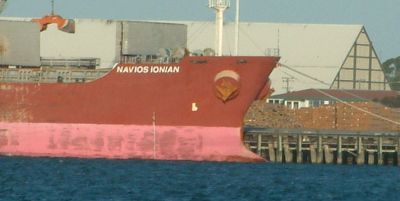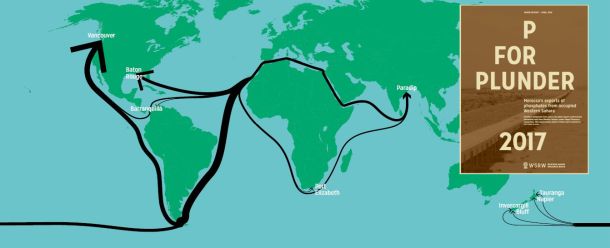
Another Greek bulk vessel is participating in the plundering of stolen phosphates from occupied Western Sahara. Check out these videos made 14 January 2008 in New Zealand.
This, time it is a vessel called Navios Ionian, owned (or managed/operated?) by the Greek company Navios, coming directly from El Aaiun, Western Sahara.
The videos below were shot January 14th 2008, at the Port of Tauranga, New Zealand. More videos are in the process of being uploaded to this article.
The United Nations states it is in violation of international law to carry out mining activities in Western Sahara without the consent of the local population.
Check out videos of Navios Ionian from Tauranga:
Video of vessel -seen from ocean
Video of vessel -seen from ocean
Video of vessel -seen from ocean
Video of vessel -seen from ocean
Video of vessel -seen from ocean
Video of vessel -seen from ocean
Video of vessel and trucks -seen from land
Video of vessel -seen from land
Video of vessel -seen from land
Video of trucks -seen from land
Video of vessel discharging cargo
Video of vessel discharging cargo
Video of vessel discharging cargo
Entrance of Port of Tauranga
Entrance of Port of Tauranga
Trucks with phosphates leaving Port of Tauranga
Trucks with phosphates leaving arriving Ballance factory
Sign of Ballance Agri-Nutrients
Sign of Ballance Agri-Nutrients

New report: Western Sahara phosphate trade halved
The export of phosphate rock from occupied Western Sahara has never been lower than in 2019. This is revealed in the new WSRW report P for Plunder, published today.
New report on Western Sahara phosphate industry out now
Morocco shipped 1.93 million tonnes of phosphate out of occupied Western Sahara in 2018, worth an estimated $164 million, new report shows. Here is all you need to know about the volume, values, vessels and clients.
New report on contentious Western Sahara phosphate trade
Morocco shipped over 1.5 million tonnes of phosphate out of occupied Western Sahara in 2017, to the tune of over $142 million. But the number of international importers of the contentious conflict mineral is waning, WSRW's annual report shows.
New report on global phosphate trade from occupied Western Sahara
Over 200 million dollars worth of phosphate rock was shipped out of occupied Western Sahara last year, a new report from WSRW shows. For the first time, India is among the top importers.



